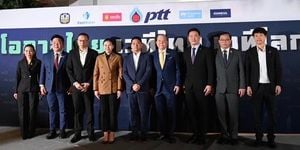The Democratic Republic of Congo (DRC) has extended its temporary suspension on cobalt exports for an additional three months, a move aimed at addressing persistent oversupply and stabilizing prices in the global market. Announced on June 21, 2025, by the country's regulatory authority, the Agency for the Regulation and Control of Strategic Mineral Substances' Markets (ARECOMS), this extension follows an initial four-month ban imposed in February 2025.
Cobalt, a vital metal used predominantly in rechargeable batteries for electric vehicles and various electronics, has seen its prices plummet to a nine-year low earlier this year. At one point, refined cobalt prices dipped to $9.6 per pound, while raw cobalt materials reached a low of $5.78 per pound. This significant price drop has severely impacted both the DRC’s fiscal revenues and the profitability of global cobalt smelters.
ARECOMS’s decision to extend the ban reflects the ongoing challenge of high inventory levels in both domestic and international markets. The suspension applies broadly, covering all cobalt exports from industrial, semi-industrial, small-scale, and artisanal mining operations within the DRC. The extension took effect immediately upon its announcement, with ARECOMS promising to review the situation before the end of the suspension period in September 2025. Depending on market conditions, the ban may be modified, extended further, or lifted.
As the world’s largest cobalt producer, the DRC accounts for over 80 percent of global cobalt output, with production projected to reach 244 kilotonnes in 2024, according to London-based GlobalData. The majority of cobalt mining takes place in the Katanga region, where both industrial and artisanal miners operate. Given the country’s dominant role in global supply, its policies wield significant influence over cobalt markets worldwide.
The initial export ban, introduced in February, aimed to reduce the glut of cobalt on the market by restricting supply, thereby stimulating a price rebound. This strategy yielded immediate effects: international refined cobalt prices surged from approximately $10 per pound to $15 per pound, and raw material prices doubled from around $6 to $12 per pound. The Chinese market, a major consumer of cobalt, also experienced sharp price increases in cobalt derivatives such as Co3O4 and cobalt salts, particularly where inventories were low.
However, despite these gains, the fundamental issue of oversupply has not been fully resolved. Inventory levels remain high, especially in upstream ore segments and downstream products like refined cobalt and batteries. Midstream inventories—comprising cobalt salt, cobalt tetroxide, and battery cells—are comparatively lower, which has prompted some midstream enterprises to increase procurement in anticipation of tighter supplies and rising prices.
Market analysts expect Chinese smelter inventories to decline to lower levels by August or September 2025. This anticipated inventory drawdown, coupled with the export ban extension, is likely to support further price increases for cobalt raw materials and related products. Yet, these price movements are expected to be gradual and heavily dependent on the recovery of downstream demand. Rapid price hikes could suppress demand, potentially limiting the extent of any rebound.
Adding complexity to the situation, Congolese authorities are considering implementing shipment quotas for mining firms as part of their broader strategy to manage cobalt supply. This proposal has garnered support from Glencore, the world’s second-largest cobalt producer, which sees quotas as a way to balance supply and demand more effectively. However, China’s CMOC Group, the largest cobalt producer, opposes the quota system and has lobbied for lifting the export ban altogether. This divergence highlights the competing interests among key players in the cobalt industry, reflecting broader geopolitical and economic tensions.
ARECOMS, established in 2019, is tasked with regulating strategic mineral markets in the DRC, including cobalt, coltan, and germanium. Its responsibilities include market stabilization, formalizing artisanal mining sectors, and ensuring compliance with international anti-money laundering and counter-terrorism financing standards. The agency’s regulatory measures, such as the cobalt export ban and potential quota system, are thus part of a concerted effort to bring order and sustainability to a market critical to the global clean energy transition.
While the export ban extension aims to alleviate the cobalt supply surplus and support prices in the short term, it also places pressure on the global supply chain, particularly Chinese smelters that rely heavily on Congolese cobalt. The DRC itself faces a trade-off: foregoing export revenues in the immediate term to stabilize prices, but risking suppressed demand and reduced income if prices remain elevated for too long.
Looking ahead, the global cobalt market is poised for a period of adjustment as supply tightness and price fluctuations seek a new equilibrium. The DRC’s strategic decisions will continue to reverberate across international markets, influencing policies, investment decisions, and the pace of technological advancements reliant on this critical mineral.
In the words of ARECOMS, the agency responsible for this significant policy move, “The decision has been taken to extend the temporary suspension due to the continued high level of stock on the market.” This cautious approach underscores the delicate balance between managing supply, supporting prices, and ensuring the long-term health of the cobalt industry worldwide.
![[SMM Analysis] DRC's export ban extended for three months, what impact will it have on the market | SMM](https://thumbor.evrimagaci.org/aMq0X6CEAwle9QeyX3glRkiZX_M=/200x0/tpg%2Fsources%2Fb54655c5-241b-44bb-bb33-14665c164aa1.jpeg)



